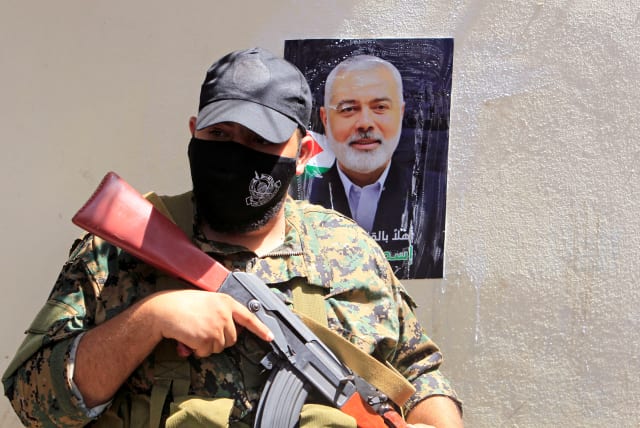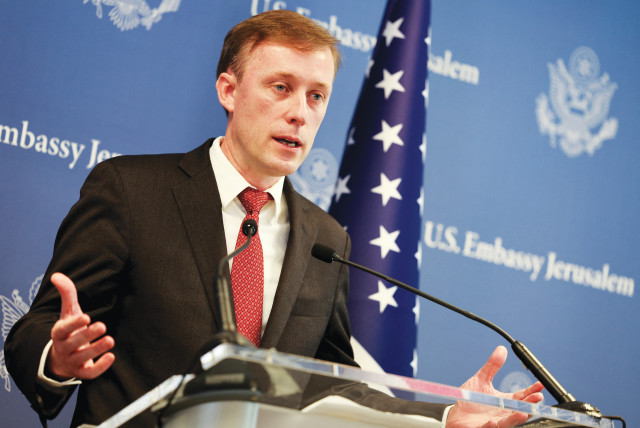White House: Gaza hostage deal hinges now on Hamas, ball is in their court

Such a deal “is in the national security interest of the United States. And we're going to press for it relentlessly," US National Security Advisor Jake Sullivan said.
Hamas delayed its anticipated response to an initial Gaza hostage proposal drafted in Paris as the war cabinet met on Sunday night, and US National Security Advisor Jake Sullivan said that the matter now rests with the terrorist group’s leaders.
“It’s up to Hamas to come forward and respond to what is a serious proposal,” Sullivan told NBC’s Meet the Press.
He discussed the proposal, which was already approved by Israel’s war cabinet and had been passed to Hamas last week by Qatar and Egypt, both of which are mediating the deal to secure the release of more than 130 hostages held in Gaza for close to five months now; around six are US citizens.
“We will continue to press the Qataris and the Egyptians to try to generate a positive response to that so that all of those hostages, including… American hostages, get home to their families,” Sullivan said.
He spoke as US Secretary of State Antony Blinken made his fifth trip to the region since the start of the Israel-Hamas war on October 7 and as US special envoy Amos Hochstein visited Israel as well, in an attempt to taper violence with Hezbollah along the country’s northern border.
The exact details of the deal have yet to be worked out or publicized, but it is broadly expected to include a sustained lull in the fighting, the release of the hostages, the release of Palestinian security prisoners from Israeli jails, and more humanitarian aid let into Gaza.
Hamas leadership, according to reports, is split between those in Gaza who want to move forward with the framework principles of the deal – even though they speak only of a protracted pause to the war and not a ceasefire – and the leadership in Doha, which wants the deal to include a permanent ceasefire. Media reports on Saturday night indicated that Hamas could reject the deal on this point alone.
Israeli politicians, including within Netanyahu’s Likud party, have already spoken out against details of the deal, many details of which are not finalized, including the number and pace of the release of Palestinian prisoners, which according to some reports could be only one hostage a day.
During the public portion of the weekly cabinet meeting, held Sunday in Tel Aviv, Netanyahu warned Hamas against driving too hard of a bargain.
“The efforts to free the hostages are continuing at all times,” Netanyahu said.
He cautioned, however, that ”we will not agree to every deal, and not at any price.” He also urged ministers to not respond publicly to every rumored report.
“Many things that are being said in the media, as if we had agreed to them, such as regarding the release of terrorists, we will simply not agree to them,” Netanyahu stated.
Israel plans to continue the war until Hamas is destroyed, he stressed.
“I would like to clarify our policy: The essential goal is – first of all – to eliminate Hamas. To achieve this goal, three things are necessary:
“First, Hamas’s battalions must be destroyed. So far, we have destroyed 17 of 24 battalions. Most of the remaining battalions are in the southern Gaza Strip and Rafah; we will deal with them."
“Second, there must be demilitarization after the battalions are destroyed, as our forces are mounting very aggressive raids in the northern and central parts of the enclave."
“Third, underground neutralization actions are required, as our forces are methodically doing in Khan Yunis and throughout the Gaza Strip, and this will yet take time,” Netanyahu said.
Sullivan told CBS’s Face the Nation on Sunday that the successful release of the hostages was of “paramount priority for us.”
Such a deal “is in the national security interest of the United States. And we’re going to press for it relentlessly as [US[ President [Joe Biden] has done, including recently in calls with the leaders of Egypt and Qatar,” Sullivan said.He had discussed the issue of the hostage with Qatari Prime Minister Mohammed Al-Thani in Washington last week.Sullivan told ABC’s This Week on Sunday that the ball was now in Hamas’ court.
“Hamas will have to be willing to say yes to an arraignment that brings hostages home,” he said.
Sullivan cautioned that a deal was not “imminent” but noted that “these kinds of negotiations unfold somewhat slowly until they unfold very quickly. It’s difficult to put a precise timetable on when something might come together or, frankly, if something might come together. Sitting here today, I cannot tell you it’s right around the corner.”Sullivan said that irrespective of the deal, US Secretary of State Antony Blinken plans to push Israel to increase the amount of aid entering Gaza.
The war, sparked by Hamas’ October 7 massacre attack against communities in southern Israel, has complicated the delivery of humanitarian assistance to Gaza.
Sullivan said that the US backs Israel’s military campaign in Gaza to destroy Hamas, but it also wants to respond to the needs of the Palestinians living in the enclave.
“We have to look out for and respond to the immense and terrible suffering of the Palestinian people. And that means pressing Israel on issues related to the humanitarian assistance that we have helped unlock and get into the Gaza Strip,” Sullivan said.
He added that “there needs to be much more of it” and that the issue will be a “top priority” of Blinken’s.“The needs of the Palestinian people” are “going to be front and center in the US approach, and we want to ensure that they are getting access to life-saving food, medicine, water, and shelter. And we’ll continue to press until that is done,” Sullivan said.
Israel argued that sufficient aid has entered Gaza, but the issues are with the UN distribution system and with Hamas, which it charged has siphoned off that aid.
Jerusalem Post Store
`; document.getElementById("linkPremium").innerHTML = cont; var divWithLink = document.getElementById("premium-link"); if (divWithLink !== null && divWithLink !== 'undefined') { divWithLink.style.border = "solid 1px #cb0f3e"; divWithLink.style.textAlign = "center"; divWithLink.style.marginBottom = "15px"; divWithLink.style.marginTop = "15px"; divWithLink.style.width = "100%"; divWithLink.style.backgroundColor = "#122952"; divWithLink.style.color = "#ffffff"; divWithLink.style.lineHeight = "1.5"; } } (function (v, i) { });

